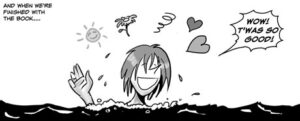Interview with author, Michele Laframboise
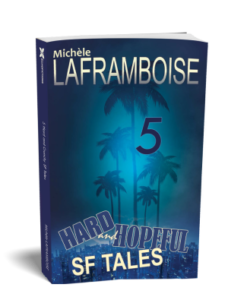
LS: You first studied at Polytechnique Montreal, I believe. What was your course of study, and did it relate in any manner to where you find yourself now?
ML: I love to learn new things and studied in geography, and later went to the Polytechnique where I met my husband and learned tons of physical concepts. This knowledge underlines most of my fictional constructions. For instance, the root-houses in several of my stories are more resistant to earthquakes than the brick and mortar ones, because of the central root axel. The root houses wobble, but do not fall. (There is an impressive earthquake laboratory on ground level.)
I studied civil engineering and really tried to fit in, but my social awkwardness kept the plush desk jobs away. I did a ton of low-wage, contractual technician-level jobs. I remember a 7-days/week for three weeks stint I did just after getting married, wearing a 22-lbs backpack with the then-heavy GPS. Two long antennas, the emitter and receptor, jutted from my back, reaching high over my head. One had a little flying saucer shape. As I stopped to register the coordinates of signposts in public places, all the curious adults asked if I searched for Martians. The children, more poetic, asked if I wanted to find a treasure.
LS: I understand your relationship with your dad was pretty special, and that in fact you made a sort of deal with him that you’d eventually be published in Asimov’s. Tell me about him, how he influenced you, and how you felt about fulfilling that promise to him posthumously.
ML: Dad was an avid SF reader, and he let me read all the books on his bookshelves, even if none were YA or children’s books. He was a mechanical engineer, and supported me when I started writing SF novels in the middle of my own engineering studies.
But he fell ill and eventually had to be hospitalized. I made the route from Toronto Union Station several times, with an Asimov’s copy that a convenience store at Union carried. When he was reading the issue, I promised him that one day, I would be published in the same magazine. That was in 2014. I sent many subs, and eventually one was accepted, and published at the end of 2021. Sheila Williams even incorporated the bit about the promise in the bio paragraph.
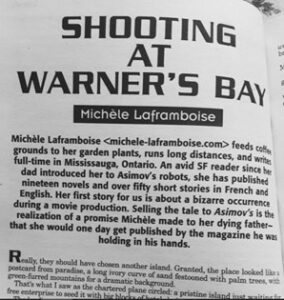
LS: Why write? What is it that inspires you, moves you to tell stories?
ML: I stared with drawing comics, and one day one story requested so many details that I decided to write it as a novel, thinking it would be easier. (it wasn’t, that first novel was workshopped to death, resuscitated, hacked, redrafted, and eventually published in 2012.) There are many mistakes we make in our first novel, and I am certain I made them all.

LS: Tell me about your creative process, how you take a story from concept to finished work.
ML: It comes from everywhere in life. An idea, a what-if… an image. As Kristine Kathryn Rusch says in her blog, write about what moves you or what revolts you, what you are passionate about. Flagrant injustices, the destruction of nature feeds my inspiration in Safe Harbor.
But I can stall if there is no strong emotional connection. For instance, I have one WIP with this nifty vessel, a problem/conflict, but I need another ingredient, a character who will carry this story, a character a reader can relate to, emote about. There has to be an emotional impact, and in that story as it is, I do not feel it. So I am stalled.
LS: Do you work on several works of fiction at a time, or do you focus on one, complete it, and move on to the next?
ML: Yes. This image will explain it better. Each story is at a certain point in life, and some need nurture. Some stay small like a short-story, some fizzle out, and some grow to be a tall novel tree.
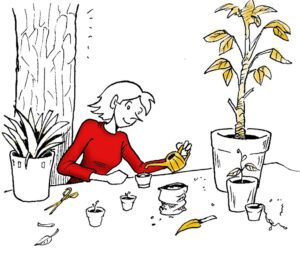
LS: When writing short stories, do you write with a specific market in mind, or mostly on spec and then find a market to fit?
ML: I write to please myself then only later do I find the potential market; sometimes I do respond to a call on a specific theme. However, the genre/readership market comes early in the stories I write. For instance, I know very fast if it will be SF, or fantasy, or contemporary.
LS: I understand you’re also an artist, and in fact illustrate some of your own graphic novels. Was an exploration of visual art something with which you were always involved?
ML: I started as a French language comic artist (at a time the words ‘graphic novel’ did not exist) and had about 10 short comic books published before deciding to tell stories with words (see question about inspiration). I would have started writing in my teens, but the French literature teachers at secondary school had this thing for dead white European authors, while I liked Asimov’s robots and space battles.
The two SF books I saw in those formative years were depressing dystopias (1984 and Brave New World) which I didn’t fully appreciate at that early age. So, no writing SF novels for me. I studied sciences, and started drawing comics. Only much later did I discover the Quebec SF community, and started tentative short-stories in French.
LS: Your focus in writing is hard science fiction, and I’m curious as to what acts as your muse in that regard.
ML: There’s no muse, there’s just a lot of events and scientific discoveries that elicit a reaction from me, wonder or indignation. It is my own instinct to check the solidity of the boards before getting on a bridge. Let’s say it is a reflex to any genre.
For instance, you read about a hardboiled detective chasing a suspect. He jumps from one building, but he misses, and falls five-stories down on the concrete. If the detective gets back up unharmed and starts running to catch the perp, your mind will tell you something’s wrong with the story. It has stopped being a detective mystery novel, and is something else entirely. Maybe set on the Moon with one sixth of the Earth’s gravity.
LS: How many novels have you written?
ML: Almost 20 in French published through traditional houses, and more than 60 short-stories in semi-pro and pro mags. Eighty are waiting, doing the rounds. I published under my imprint two novels in English, both ecological contemporary romances set in a small coastal town. A third is in the works. Not science fiction, but the science is there.
LS: You have also established your own imprint. What inspired you to do that?
ML: Traditional publishing houses are like those rope bridges in adventure movies: they fall behind me along with their distribution channels. So, I have currently 13 orphan YA novels. I established my indie publishing house to offer my backlist of novels, and reprint already published short-stories. The same goes for all my comic books, now in the wild.
My Echofiction imprint does publish original stories, for people with a short attention span or adults learning a new language. The shorter format allows them to read a complete, satisfying story. Cardboard Boy and the Lady Bird series of ornithological adventures are booklets that would be too expensive for a traditional publisher to distribute. Échofictions makes very short print runs, about 25 books each time, so I am not bankrupt, and I can carry the books to the public at events close to my home.
It is my conviction that I do not need a billion readers, but that my voice and brand of fiction can comfort my readers, help them escape sad thoughts, provide food for reflection, and raise their spirits. A few hundred faithful fans would be enough for me to make a living.
LS: I know from discussion with you you’re a very disciplined writer, dedicating a specific portion of your day to work, with an attendant word count. Have you always worked that way? Is that something you had to discipline yourself to?
ML: Yes. It depends on the project. I do lose less time on research, contrary to my first forays in writing.

These days, I am lagging behind my planned word count because I am working on a graphic novel, and adding news pages, and translating the dialogue takes some time.
During this hot summer, I get in my cool basement office seven days a week.
Morning is my usual go-to write time. I do my best to start before 9:30, because otherwise I feel I have lost my morning. In the afternoon I do non fiction (blogs and my newsletter) or promotional work. Of course, I spend more hours on weekends than on weekdays.
LS: You’re also a bilingual writer, a skill which I find quite astonishing, little say humbling. As a francophone, are you ever frustrated with the anglophone publishing industry?
ML: I don’t have enough direct relations with those publishers to be frustrated. Except Tor Books, who never, ever replied to my submissions. It’s like a black hole. Not even a simple “Sorry, your submission does not fit our editorial line.”
The French language publishers often want extensive rewrites. It is stressful, especially when the editor is NOT well-acquainted with science-fiction. One replaced “a magnetic sweep” by a “simple hand-brush over clothes” because she did not want the word magnetic repeated!
LS: As an indie author, what difficulties do you encounter, and how do you work around those?
ML: Right now, my biggest hurdle is to get my indie-published books discovered without paying a fortune in advertising.
And there is that thing that (some) readers do, buying the e-book then returning it, asking for a refund. I didn’t happen to me because my sales are low. Selling a piece to Asimov’s and Analog pays me more than the reading platforms, and gives me name recognition. Even my interviews with the CBC-Toronto French branch do not make a blip on the radar.
Another hurdle is that the schools won’t buy Echofictions titles because of the politics of buying only from established libraries, and at the moment no libraries carry my indie titles. It is fortunate that I still have four trad-pub books in circulation. Some schools where I visit can buy directly from me.
The most arduous hurdle is self-doubt: I am ALWAYS on a roller coaster between bouncing enthusiasm and abyssal self-doubt. In the comic field, I am at the bottom of a deep well. In the SF field, I am barely visible, and sensitive when a writer I admire disses either my work, my favorite genre, or stories I love. (It happened yesterday, and it crushed my afternoon of work.)
I am always questioning the value of my contribution as an artist.
LS: Now that COVID restrictions have lifted, I understand you’re attending more in-person conventions and venues. Where might readers find you this year?
ML: Very difficult this year.
I’m trying to get in the Mississauga Comic Book Show in October 2022. But, alas, one of their conditions for a local author is the size of your social media following. So not many public events this year, but more next year, like the Toronto French Book Fair in March 2023.
LS: It’s my understanding your novels are available in trade paperback and ebook. Are you looking to releasing in audiobook in the future?
ML: I wanted to, I even enlisted a well-meaning person to do the voice, but it did not pan out. I don’t have the time to do it myself properly. I hope to narrate some of my short-stories, but I would prefer hiring someone else. And the proprietary platforms, too, are a problem.
LS: Where can readers purchase your novels?
ML: Electronic versions of my books are available on all platforms, but the paper copies can be obtained only via Amazon, or signed editions directly from me, adding postage. For signed paperbacks, contact me through my site: michele-laframboise.com, Echofictions.com with the subject heading “signed book”
I am working to get a few Toronto-based bookshops to carry my books.
Electronic: on all the usual platforms: Amazon, Kobo, Apple… and soon, Google.
Paperback: Amazon
I do my best to raise other writer’s profiles, too, mainly on Goodreads and on my blogs. I buy their books, even if it takes me forever to read them.
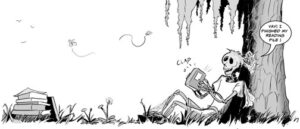
I should really blog more, but my objective is writing and publishing new books.
However, I do NOT critique books from fellow authors: I share my reading pleasure. I never say anything negative or diss another’s writing, even if I disliked the story. If a book really stinks (to my taste), I don’t talk about it, I don’t even slam a one-star evaluation.
I can’t physically stop wars, clean pollution or remove corrupted backward-leaning politicians, but I can enrich the mental ground with stories and characters and new memes. I like reading enthralling stories that prod me to create new works of wonder.
